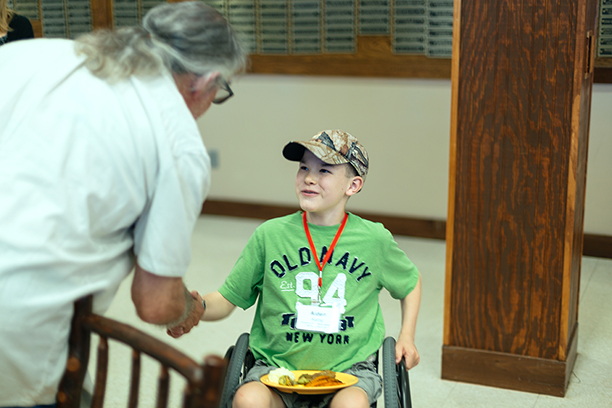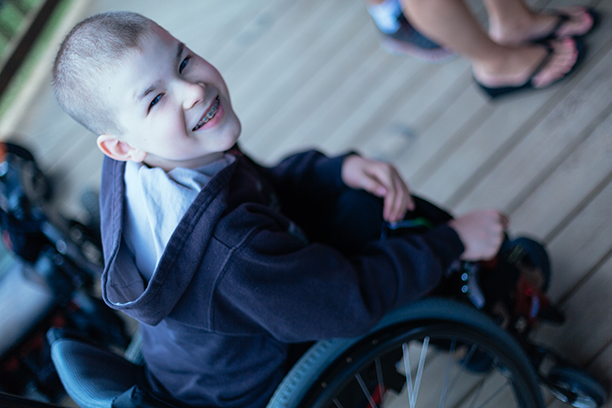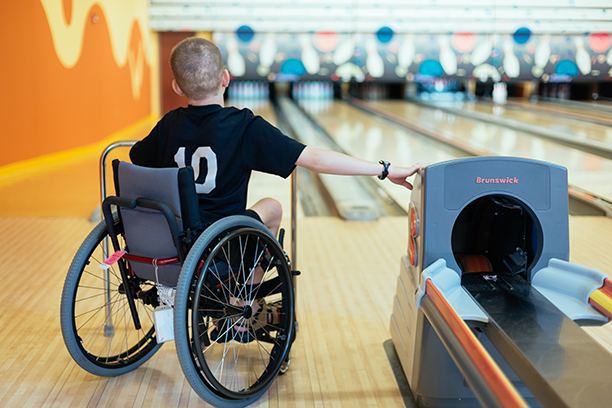We received a new member form from a Mom on July 1st. Her 10-year-old son suffered an inflammatory attack in the high thoracic region of the cord and received a TM diagnosis. The attack started on May 12th. They live on the west coast. When we receive new member forms from people who are very recently diagnosed, we contact them as quickly as possible to make sure they are receiving good medical care, help them develop expectations about acute treatment and rehabilitation directing them to information on our web site, and to offer them support. When they are told that a loved one has TM or ADEM or NMO or ON, we know that it is very likely that they are hearing those terms for the first time, and they have absolutely no context for thinking about what happened or what their future is going to look like. We know that our contacts can make a difference for them.
And so it was with this family. I spoke to the Mom and we talked about his acute therapy. I assured her that her child received exceptional care and that he was provided the most aggressive acute therapies possible for his attack. He received high dose intravenous steroids, PLEX and Cytoxan. He didn’t respond dramatically to any of these therapies. We spoke for a long time, and I made sure that Mom understood how to find information on the website and connect with other families who would be able to provide this family with support and information.

And then I said the following to Mom. “My wife got TM 20 years ago. If someone had told me what I am about to tell you, my head would have blown up. But I’m going to say what I have to say, and then I’m not going to make it easy for you to say no. We have our SRNA Family Camp coming up on July 23rd, and your son and your family need to be at this camp. It is at the Center for Courageous Kids located in Southern Kentucky. You would need to fly into Nashville airport, and Debbie and Michael Capen will pick you up from the airport and bring you to camp. I know that your son just had this attack, and I understand what I am saying to you about putting your lives on hold three weeks from now, and flying with a paralyzed child across the country to get there, but you have to do this. There will be no one at this camp who will benefit more from this experience than your son and your family.”
Mom told me that she was a stay at home Mom with two children. She said that her husband was in school, so they had very limited funds. And they were also in the process of moving into a new home. Her son was going to be discharged from the hospital the next week and then the move was going to happen at about the same time. I heard what she was saying, I confirmed that her life was way more than totally insane, and then I reiterated that none of this mattered and that she had to find a way to get to camp. I told her that I would help her brainstorm about how to raise the funds to get there, because their flights would likely cost them almost $3,000.

I told Mom that by virtue of their coming to camp, everything about her son getting TM would change. We organize a three day education program for the parents, and we cover every major aspect of these disorders, from what happens acutely, the importance of rehabilitation, all of the symptom management issues, as well as psychological, emotional, educational and social issues. Drs. Kerr, Greenberg and DeSena will be at camp. There aren’t any more knowledgeable or experienced physicians anywhere who understand these neuroimmune disorders better than they do. And these physicians don’t just have the knowledge and experience, they also genuinely care for their patients and for the members of our community. This is the case with all of the medical professionals we invite to camp. They take a week away from their busy schedules and away from their families to spend this time with us at camp. In addition to the education program, they also make themselves available to the families all day long. There are informal discussions that go on between the physicians and the families at the archery range, at the fishing dock, at the horse stables, in the swimming pool, at arts and crafts, and in the dining hall, during meals and between dancing. Dr. Becker who has a specialization in neuro-rehabilitation will join us and provides parents with critical information about expectations in regard to an aggressive rehabilitation program for their children. Audrey Ayers is a nurse from UTSW and Janet Dean is a nurse practitioner from Kennedy Krieger Institute. Both have extensive knowledge and expertise with all of the rare neuroimmune disorders, and will offer important information about the management of symptoms. Drs. Lana Harder and Joy Neumann are clinical psychologists. They will be talking to the parents about issues involving cognition, mood and emotional issues that can be associated with these disorders. Also, during camp, these clinical psychologists, along with Sam Hughes, a researcher from UTSW, will be conducting an important follow up study on cognitive dysfunction in pediatric TM. Finally, Dr. Anjali Forber-Pratt will be attending camp. Anjali got TM before she was one year old. She is currently an Assistant Research Professor at the University of Kansas’ Beach Center on Disability and is also a Paralympic gold medalist in wheelchair racing. Her presence is inspirational for the children and for the parents. She is a wealth of information about living with these disorders, and in maximizing quality of life.

Your child will meet other children who have TM and who understand what he has gone through better than anyone … even his own parents. That connection will be incredibly powerful for him, and he will make friends at camp that he will have throughout the year, and for the rest of his life. And being at camp is not at all about being sick. It is about having fun. The camp is entirely accessible and they offer an accessible recreation program. The kids and the families have an awesome time. The kids have incredible activities all day long, beginning at 7:30 in the morning and going until dinnertime at night. There is awesome dancing after breakfast and dinner. And then every evening there is a wonderful program for the families that includes everything from the infamous messy games to movie night to Carnivals that culminates with fireworks and a beautiful closing ceremony. The siblings have every bit as much fun as the kids who come with these rare disorders.

And the children receive so much nurturing and support. There is an excellent camp staff and the program and camp counselors are so attentive with the children and offer them so much care during the week. These counselors really bond with the children. Dr. Lana Harder also meets with the children who have the disorders, and they are given the opportunity to have a discussion between themselves. The same discussion session is led by Dr. Harder for the siblings. This is a great opportunity for the children to have an open, honest and safe conversation without anyone else in the room.

It will be a fabulous week for your child and for your entire family. You have to find a way to do this. And you and your husband will meet other parents who have been through all of what you have been through, and more importantly, have been through everything you will be going through in the future. You won’t have to hack your way through the jungle; these parents are going to be able to show you the paths, and this is going to make your journey with this disorder so much easier to negotiate. I often believe that you will learn more and gather more important information from other parents than you will from the physicians. And they will offer you understanding and support in ways that you just cannot get anywhere else. Their empathy is the most immediate and the most intense and the most sincere. They understand you in the most intimate way. My experience has been that the friendships that are formed at camp, as with the children, will go on all year long and for the rest of your lives.

And so, I took Mom through the application process and then followed up with some phone calls to help her brainstorm about ideas for how she might raise the funds to pay for flights. I also told Mom that since they were flying from across the country that they might consider coming to camp on Tuesday so that they had a day to decompress and relax before camp started late Wednesday afternoon.
And that is precisely what they did. They came to camp and they arrived late on Tuesday night. When Pauline, Kazu and I arrived around noon on Wednesday, one of the first families I saw was this family, and I introduced myself to Mom and to Dad and the two children. And of course, I hugged Mom. What a journey.
It was an awesome camp. It was just as I described. We had 36 families attend from across the United States, from Canada, and from Norway, Australia and China! At the end of camp, the Mom from China asked me if I went to Ohio State, and I told her that I did. She said that she went to Ohio State for a year as an exchange student from Shanghai. We both laughed, and then we said good-bye, and we both sobbed. O-H-I-O.

During the entire camp, I was totally transfixed by the experience this family was having who had come from across the country just two months from the time their beautiful son got TM. I kept thinking about what Pauline’s and my experience was like, as compared to what this family and this child were experiencing. There were no specialists when Pauline got TM; it wasn’t until 1999 that Dr. Kerr announced his specialization in TM and the establishment of the first TM Center at Johns Hopkins. This family, just two months from the attack was attending an education program with specialists who directed TM Centers and who had acquired experience and expertise through more cases of TM, NMO and ADEM than anyone else in the world (along with Dr. Pardo at Johns Hopkins). It took three years before Pauline and I met another person who had TM. In just two short months, this family was surrounded by people who would offer this child and this family a critical part of their support network going forward. There was absolutely no information available for us about TM or about symptom management or about rehabilitation. This family was going to be immersed in an education program that offered them the information they needed to advocate with their physicians at home for the best possible rehabilitation program for their son and also the most effective symptom management strategies. This family was connecting with the medical professionals and arranging to travel to see these physicians so that they could evaluate their child and offer him direct medical care. As a result of their coming to camp, the experts on pediatric TM would be taking on the care of this child.

What a blessing. Thinking about how this all happened and the experience of this family just totally blows my mind. Seeing the family covered in every kind of goop known to human kind during the messy games and then taking their place under the water coming out of the fire truck, put this entire event into the proper perspective. Camp is not about being sick or being a family with a child with TM or NMO or ADEM. Camp is about bringing a family together to celebrate life – to celebrate their lives. It was a blessing for this family and it is a blessing for every family who attends. It is a blessing for the doctors and medical professionals who come to camp, and it is a blessing for everyone who comes to volunteer. This camp is such a very special place. We remain so grateful to The Center for Courageous Kids for this incredible opportunity.

And now we will just think about and look forward to next year. 2015 Annual SRNA Family Camp at Center for Courageous Kids in Scottsville, Kentucky , July 22 – 26, 2015.
~ Sandy Siegel, President of SRNA
Watch our Messy Games video below!




